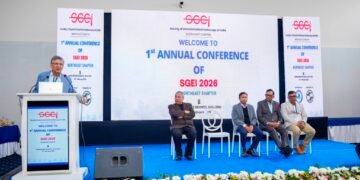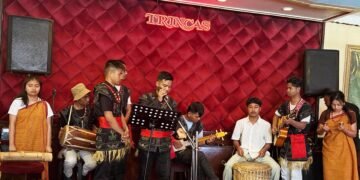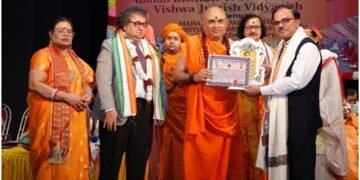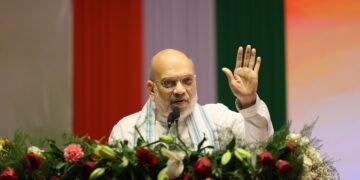While taking a very practical, pragmatic, progressive and persuasive approach, the Meghalaya High Court has in a landmark, learned, laudable and latest oral judgment titled Manik Sunar & 2 Ors. Vs State of Meghalaya in Crl. Petn. No. 43 of 2022 that was finally decided on October 14, 2022 while dealing with a petition that was filed by the petitioner-accused who was charged with offences under POCSO and IPC, ordered for the quashing of the offences on grounds that the alleged victim was in a consensual relationship with the accused.
It must be mentioned here that the facts which led to the present matter were that the complainant-father had filed an FIR stating that his minor daughter aged 16 years had gone missing and was allegedly raped by the petitioner-accused. It must also be mentioned here that subsequent to the FIR, investigation was launched and statements of witnesses including the alleged victim were recorded under Section 161 and 164 of the CrPC.
The High Court took note of the statement of the girl who stated that the sexual relationship was based on the bedrock of love and of the fact that the alleged victim had in fact married the petitioner-accused upon attaining majority.
At the very outset, this brief, brilliant, bold and balanced judgment authored by the single judge bench of Justice W Diengdoh sets the ball rolling by first and foremost putting forth briefly in para 1 that, “An FIR dated 15.02.2020 was filed by the petitioner No. 3 before the Officer-in-Charge, Lumdiengjri Police Station reporting that his daughter aged about 16 years was missing since the previous day but was however brought back the next day by the petitioner No. 1 herein. It is alleged that the petitioner No. 1 is the perpetrator who had abducted the minor daughter of the complainant and who has also raped her in the process.”
Needless to say, the bench then states in para 2 that, “Investigation was accordingly launched and the statement of the relevant witnesses including the alleged victim was recorded, both under Section 161 as well as under Section 164 Cr.PC.”
To put things in perspective, the bench then envisages in para 3 that, “On completion of the investigation, the Investigating Officer (I/O) has filed the charge sheet indicating that a prima facie case under Section 363 IPC read with Section 3(a)/4/9(n)/10 of the POCSO Act, 2012 is found well established against the petitioner No. 1 herein. Interestingly, on the basis of the statement of the alleged victim where she has made certain allegations against the petitioner No. 3 herein who is also her father as well as the complainant in the case, the I/O has also impleaded him as an accused in the case, finding that a case under Section 7/8 of the POCSO Act is found well established against the father.”
As it turned out, the Bench then discloses in para 4 that, “The case was then taken up by the learned Special Judge (POCSO), Shillong registered as Special POCSO Case No. 52 of 2020. On consideration of charge, the learned Special Judge (POCSO), Shillong has framed charges against the petitioner No. 1 under Section 375(a)/375 sixthly/376(2)(n) IPC read with Section 3(a)/5(l)/6 of the POCSO Act. The petitioner No. 3 has also been made co-accused in the case and charges under Section 354/354A(i) IPC read with Section 7/9(n)/10 of the POCSO Act were framed. The stage of the case is for recording of the prosecution witnesses’ statements.”
As we see, the bench then points out in para 5 that, “Mr. S. Marpan, learned counsel for the petitioners has submitted that the principal character in this case is the petitioner No. 2, the alleged victim and the fate of the case would hinge on her testimony. However, from her statement made before the police under Section 161 Cr.PC as also the one made before the Magistrate under Section 164 Cr.PC would exhibit the same trend, that is, the consistent assertion by the alleged victim that she is in a love relationship with the petitioner No. 1 and as such, there is no question of force or assault involved as far as their sexual relationship is concerned. The same being consensual and voluntary, at the end of the day, the prosecution may not be able to prove the case to convict the accused/petitioner No. 1.”
Do note, the bench then observes in para 6 that, “As far as the allegations made against the petitioner No. 3 is concerned, the petitioner No. 2 has submitted that she no longer wishes to pursue the matter keeping in mind the close relational proximity of the parties and as such, by this instant petition it is prayed that the prosecution against the petitioner No. 3 may also be quashed.”
Of course, the bench then mentions in para 7 that, “It is finally submitted that this application under Section 482 Cr.PC may be allowed and the proceedings in Special POCSO Case No. 52 of 2020 may be set aside and quashed.”
It deserves mentioning that the bench then reveals in para 8 that, “Mr. H. Abraham, learned GA appearing for the State respondent has submitted that though the alleged victim girl/petitioner No. 2 has stated that she is now married to the accused/petitioner No. 1, the fact remains that at the time of commission of the alleged offence the petitioner No. 2 was about 16 years old and as such was a minor and therefore, even though she may have got married after attaining the marriageable age, the acts of the petitioner No. 1 cannot be condoned in accordance with law. This petition is therefore devoid of merits and the same is liable to be dismissed.”
Needless to say, the bench then states aptly in para 9 that, “The argument advanced by the learned counsel for the parties have been duly considered and the petition as well as the case record produced before this court have been perused.”
On the face of it, the bench then specifies in para 10 that, “What can be understood from the submission made as well as from the materials on record, the initial complaint is that the petitioner No. 1 has kidnapped or abducted the petitioner No. 2 and has committed sexual assault on her person for which the petitioner No. 1 is liable to be prosecuted in accordance with law.”
Most significantly, the bench then minces no words to hold in para 11 what constitutes the bedrock of this notable judgment that, “The fact as it stands has not been denied by the parties concerned, however the alleged victim girl has categorically stated that it is not a case of sexual assault allegedly perpetrated by the petitioner No. 1 but any act, sexual in nature was a result of consent by both parties based on the bedrock of love. Therefore, such an act cannot be construed as an act of sexual assault. The relationship between the petitioner No. 1 and petitioner No. 2 has been further cemented by the fact that on attaining the legal age fit for marriage, the two have entered into a marriage covenant and the same was accordingly solemnised with the consent of all the family members. The marriage was formally solemnised first at Mahadev Khola (Hindu Temple) for which a marriage certificate was issued by the priest In-charge, Mahadev Khola Dham, Shillong certifying that the said marriage was solemnised under Hindu rites on 05.04.2022. Again, the parties involved have got themselves married under the provision of the Special Marriage Act for which the office of the Marriage Officer, East Khasi Hills, Shillong have issued a marriage certificate confirming that the two have got married under the said Act on 15.09.2022, such marriage being witnessed by the family members of both sides.”
Quite ostensibly, the bench then concedes in para 12 that, “In cases of this nature, since it is evident that the alleged aggrieved person has indicated that she is no longer interested in pursuing with the matter and all those who are involved are also not keen to prosecute the matter, it may perhaps be a futile exercise for the prosecution to ensure conviction of the accused under such circumstances.”
It is worth noting that the bench then hastens to add in para 13 that, “A number of High Courts dealing with cases of a similar kind as the present case have also come to the conclusion that prosecuting cases of this kind may be only a formality with the ends of justice not actually achieved. The Hon’ble Madras High Court in the case of Vijayalakshmi & Anr. v. State Rep. By. Inspector of Police, All Women Police Station, Erode: Crl. O.P No. 232 of 2021, para 12 & 18 has held as under:
- “As rightly recognised by the learned single judge of this court in Sabari’s case (cited supra), incidences where teenagers and young adults fall victim to offences under the POCSO Act being slapped against them without understanding the implication of the severity of the enactment is an issue that brings much concern to the conscience of this court. A reading of the Statement of Objects and Reasons of the POCSO Act would show that the Act was brought into force to protect children from offences of sexual assault, sexual harassment and pornography, pursuant to Article 15 of the Constitution of India, 1950 and the Convention on the Rights of the Child. However, a large array of cases filed under the POCSO Act seems to be those arising on the basis of complaints registered by the families of adolescents and teenagers who are involved in romantic relationships with each other. The scheme of the Act clearly shows that it did not intend to bring within its scope or ambit, cases of the nature where adolescents or teenagers involved in romantic relationships are concerned.”
- “In the present case, the 2nd Petitioner who was in a relationship with the 2nd Respondent who is also in his early twenties, has clearly stated that she was the one who insisted that the 2nd Respondent take her away from her home and marry her, due to the pressure exerted by her parents. The 2nd Respondent, who was placed in a very precarious situation decided to concede to the demand of the 2nd Petitioner. Thereafter, they eloped from their respective homes, got married and consummated the marriage. Incidents of this nature keep occurring regularly even now in villages and towns and occasionally in cities. After the parents or family lodge a complaint, the police register FIRs for offences of kidnapping and various offences under the POCSO Act. Several criminal cases booked under the POCSO Act fall under this category. As a consequence of such a FIR being registered, invariably the boy gets arrested and thereafter, his youthful life comes to a grinding halt. The provisions of the POCSO Act, as it stands today, will surely make the acts of the boy an offence due to its stringent nature. An adolescent boy caught in a situation like this will surely have no defense if the criminal case is taken to its logical end. Punishing an adolescent boy who enters into a relationship with a minor girl by treating him as an offender was never the objective of the POCSO Act. An adolescent boy and girl who are in the grips of their hormones and biological changes and whose decision-making ability is yet to fully develop, should essentially receive the support and guidance of their parents and the society at large. These incidents should never be perceived from an adult’s point of view and such an understanding will in fact lead to lack of empathy. An adolescent boy who is sent to prison in a case of this nature will be persecuted throughout his life. It is high time that the legislature takes into consideration cases of this nature involving adolescents involved in relationships and swiftly bring in necessary amendments under the Act. The legislature has to keep pace with the changing societal needs and bring about necessary changes in law and more particularly in a stringent law such as the POCSO Act.”
While citing yet another relevant case law, the bench then states in para 14 that, “The Hon’ble Calcutta High Court in the case of Ranjit Rajbanshi v. State of West Bengal and Ors: C.R.A. No 458 of 2018, High Court of Calcutta, at para 47, 48 & 49, have echoed similar views in this regard, extracted as follows:
- “In the present case, the victim girl was admittedly 16 and half years old and studied in Class XII at the relevant point of time. She was not naïve enough not to know the implication of sexual intercourse; rather, the victim admittedly had a physical relationship with the accused who was also of a very young age, on several occasions prior to the incident. Although the consent of a minor is not a good consent in law, and cannot be taken into account as ‘consent’ as such, the expression ‘penetration’ as envisaged in the POCSO Act has to be taken to mean a positive, unilateral act on the part of the accused. Consensual participatory intercourse, in view of the passion involved, need not always make penetration, by itself, an unilateral positive act of the accused but might also be a union between two persons out of their own volition. In the latter case, the expression ‘penetrates’, in Section 3(a) of the POCSO Act might not always connote mere voluntary juxtaposition of the sexual organs of two persons of different genders. If the union is participatory in nature, there is no reason to indict only the male just because of the peculiar nature of anatomy of the sexual organs of different genders. The psyche of the parties and the maturity level of the victim are also relevant factors to be taken into consideration to decide whether the penetration was a unilateral and positive act on the part of the male. Hence, seen in proper perspective, the act alleged, even if proved, could not tantamount to penetration sufficient to attract Section 3 of the POCSO Act, keeping in view the admitted several prior occasions of physical union between the accused and the victim and the maturity of the victim.”
- “As such, it cannot be said that the accused was guilty of penetrative sexual assault, as such, since here the act of penetration, even if true, would have to be taken not as an unilateral act of the accused but a participatory moment of passion involving the participation of both the victim and the accused.”
- “Although the question of consent does not arise in case of a minor, in order to attract Section 376(1) of the IPC, it had to be established that the alleged offence was committed against the will of the victim. Read in conjunction, the provisions of Section 376 of the IPC and Section 3 of the POCSO Act ought to be construed on a similar footing and cannot incriminate the accused for a voluntary joint act of sexual union.”
As a corollary, the bench then mandates in para 15 that, “In the light of the above, this court is of the considered opinion that the prayer of the petitioners can be allowed by an exercise of the inherent power of this court to meet the ends of justice.” In addition, the bench directs in para 16 that, “The petition is accordingly allowed, the proceedings of Special POCSO Case No. 52 of 2020 before the court of the learned Special Judge (POCSO) Shillong is hereby quashed.”
For sake of clarity, the bench then clarifies in para 17 that, “The petitioners are set free from any liabilities in the case including discharge of the bail bond, if any.” Furthermore, the bench then directs in para 18 that, “Registry to send back the case record.” Finally, the bench then concludes by holding in para 19 that, “Petition disposed of. No costs.”
In essence, the key take away from this remarkable, robust, rational and refreshing judgment is that the Meghalaya High Court has taken the stand that sexual activity was a result of consent by both parties based on the bedrock of love. It also clarified that such an act cannot be construed as an act of sexual assault. So it was but natural that the POCSO case was quashed against the accused so very commendably by the Meghalaya High Court! No denying it!
(The writer is a lawyer based in Meerut, Uttar Pradesh)




























